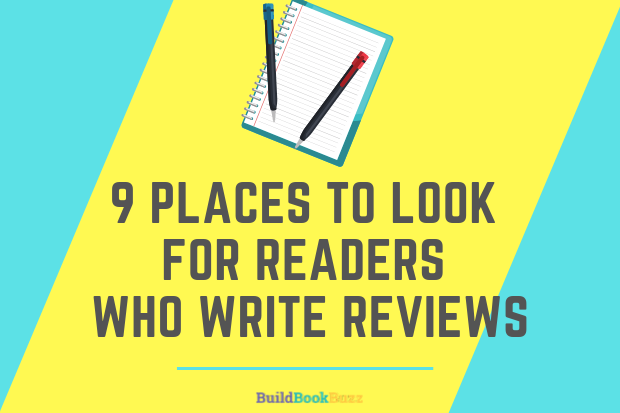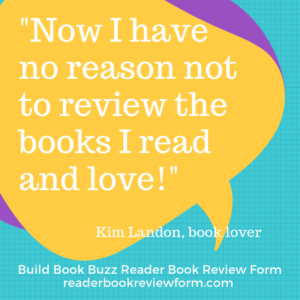9 places to look for readers who write reviews
You know that you need reader reviews for your book. The challenge is finding those readers who write reviews. Here are 9 places to look.
You probably don’t need to be reminded that you need to get more readers to review your book.
You need readers sharing their opinions for many reasons, including:
- They provide others with evidence that they won’t be wasting their time or money on your book. Marketers call this “social proof.”
- Your advertising dollars will be wasted without them.
- You can often use reader feedback to tweak your description or correct mistakes.
It’s one thing to know this and another to know how to make it happen. Often, the big question is: “Where can I find readers to review my book?”
Where are the readers?
Here are nine places you can look to find the right readers to review your book.
Please note that in all cases, you’re offering a free digital copy in exchange for an honest review posted on Amazon or Goodreads.
Why those two sites? Amazon sells the most books online; Goodreads is where readers gather to discuss books. You want your readers to review your book on either or both.
1. Social media
On the network or platform where you have the highest quality connections (the right types of readers), offer a free book in exchange for an honest review .
If you don’t have a strong online following, ask a friend who does to make the offer for you.
2. Your email list
People who add themselves to your email list are interested in what you write about it. Take advantage of that and use your list to find reviewers.
Ask for more volunteers than you need, because a significant percentage won’t follow through.
3. Online reader groups
Online groups can be an excellent resource for reviews.
For novels, use genre-specific or reader review groups on Facebook. Search there for your genre — for example, “romance book reviews” — or “Kindle reviews” — and select “Groups” in the top menu.
You’ll have to ask to join a private group before you can see the group’s content and its rules for soliciting reviews. (Search results indicate whether a group is public or private.) The Kindle/Ebook/Book Promo & Reviews group is an example of a public group.

If yours is a business book, use the groups you belong to on LinkedIn.
When your book is related to your profession, offer a review copy in forums hosted by trade associations you belong to, also.
4. Public speaking audiences
When you’re speaking at conferences or other events, ask for volunteers from the audience. That’s what life coach and author Andrieka J. Austin does.
“I’ve used several of my past clients and event attendees for reviews,” she says.
Use a signup form or collect business cards.
5. Free book offer newsletters and websites
The first step is setting your sales price as free so it’s easy for readers to use their favorite online retail sites to get it.
Once it’s free, advertise in newsletters and on reader sites that tell readers about free e-book offers. Here are links to site and newsletters offering this service:
In addition, let your email list and social networks know that the book is free so that they may also download it.
Keep in mind, though, that many people grab a free book simply because it’s free. And, even if they intend to read it, they might not get around to it for months. So, don’t expect instant results.
6. Services that send e-books to readers for reviews
One of the best ways to reach new-to-you readers who review books is to pay for a service that connects authors looking for reviews with readers who agree to write them.
Options include:
- Bookfunnel
- NetGalley
- The Kindle Book Review
- BookRazor
- Edelweiss
- Hidden Gems Books
- Booksprout
- Prolific Works
- Book Sirens
7. A request at the end of the book
As a reader, I love it when I see a personal request from the author at the end of the book.
Make yours heartfelt and specific. Tell readers how much it would mean to you to learn what they thought of your book.
Once your book goes live, edit the file to include a direct link to the “leave a review” section of your book on its Amazon page. This will make it as easy as possible for them to post that review.
8. Bloggers
Do a Google search to find two types of bloggers: those who review books in your category or genre and those who blog about your book’s topic.
Reedsy’s “Best Book Review Blogs of 2024” is a sortable list that offers a short blog description, the blog URL, and the blogger’s name. You’ll need to visit each blog to get contact information.
A topic blogger receives fewer review requests and is therefore more likely to be willing to review a free book that’s related to the blog’s subject.
9. Influencers
For fiction, people who influence your ideal readers are often popular authors in your genre. You aren’t going to get Danielle Steele or Stephenie Meyer to review your book, of course. You have a much better chance of connecting with authors who are doing well, but are still on their way up.
Nonfiction writers can approach thought leaders in their fields, as Sonia Frontera does for Solve the Divorce Dilemma: Do You Keep Your Husband or Do You Post Him on Craigslist? In her case, that’s divorce and domestic violence professionals.
Want to save this list? Download a copy of it here so it’s always handy.
Make it easy for readers write reviews
Your goal whenever you’re asking anyone to do a favor for you (and writing a review is a favor) is to make it as easy as possible for them. It’s the best way to ensure that they follow through with their commitment.
That’s why when you send a free copy of your book in exchange for an honest review, you want to include a Build Book Buzz Reader Book Review Form.
This fill-in-the-blanks PDF document saves readers time by walking them through the review process. Simply by answering a few questions that helps them focus their thoughts on what other readers want to know, they can write a meaningful review in less than 10 minutes.
Buy your Reader Book Review Form once; send it to as many readers as you need to.
Learn more at ReaderBookReviewForm.com.
Where do you find readers to review your books? Please tell us in a comment!
(Editor’s note: This article was first published in September 2019. It has been updated and expanded.)
Like what you’re reading? Get it delivered to your inbox every week by subscribing to the free Build Book Buzz newsletter. You’ll also get my free “Top 5 Free Book Promotion Resources” cheat sheet immediately!



I DID BOOKsprout and got five reviews the first time out. i’m currently using it for my new book, Daddy’s Girl and the day after i posted it, i got six takers to read it and one posted two days later a review. I was very glad and surprised, but grateful
That’s fantastic, Sylvia! Thanks for that feedback. I’m glad it worked the way it’s supposed to for you!
Sandy
I’ve seen loads of authors request reviews on Goodreads. If you’re subscribed to one of their special interest groups, you’re in touch with people who probably like your specialty already.
Thanks, Bonnie. I’ll tell you why I didn’t include Goodreads. It’s a different animal, unlike any other social platform, and it’s really easy to make a mistake there. You could get kicked off the platform for asking for a review in the wrong place — which is anywhere but a group that’s set up specifically to allow review requests. Because it’s so tricky, and because many people don’t take the time to learn the ins and outs before jumping in, I left it off because I felt there was so much potential for trouble. You even risk problems if you thank someone for writing a favorable review on that site. It’s always best to use Goodreads as a reader, not an author, for quite awhile before starting to use it for any kind of promotional purpose.
Sandy
I would like to make a suggestion myself.
Create a youtube account and start your own book promotion channel. Discuss everything about your books such as the writing journey and how your topic came about.
Thanks, John. Have you thought about flipping that idea a bit and using your YouTube account to review books in your genre? That’s something I’m thinking about doing.
Sandy
That’s an excellent idea. That would also work as well. I think both options used in conjunction would be a good way to implement action.
Another great article — I’m sharing with my author clients.
Reviews help sell books!
Thanks for sharing this so we can help more authors, Peggy!
Sandy